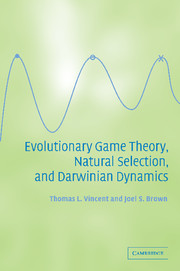Book contents
- Frontmatter
- Contents
- List of figures
- Preface
- 1 Understanding natural selection
- 2 Underlying mathematics and philosophy
- 3 The Darwinian game
- 4 G-functions for the Darwinian game
- 5 Darwinian dynamics
- 6 Evolutionarily stable strategies
- 7 The ESS maximum principle
- 8 Speciation and extinction
- 9 Matrix games
- 10 Evolutionary ecology
- 11 Managing evolving systems
- References
- Index
9 - Matrix games
Published online by Cambridge University Press: 11 August 2009
- Frontmatter
- Contents
- List of figures
- Preface
- 1 Understanding natural selection
- 2 Underlying mathematics and philosophy
- 3 The Darwinian game
- 4 G-functions for the Darwinian game
- 5 Darwinian dynamics
- 6 Evolutionarily stable strategies
- 7 The ESS maximum principle
- 8 Speciation and extinction
- 9 Matrix games
- 10 Evolutionary ecology
- 11 Managing evolving systems
- References
- Index
Summary
Matrix games, introduced in Subsection 3.1.2, formed the core of the early work on evolutionary games. Most game theoretic models, notions of strategy dynamics, solution concepts and applications of ESS definitions occurred explicitly in the context of matrix games. For continuous strategies, modelers relied on either Nash solutions (Auslander et al., 1978), or model-specific interpretations of the ESS concept (Lawlor and Maynard Smith, 1976; Eshel, 1983). The bulk of developments in evolutionary game theory associated with matrix games pre-date the G-function, strategy dynamics, and the ESS maximum principle. For a review of these developments see Hines (1987), Hofbauer and Sigmund (1988), and Cressman (2003). In this chapter, we place matrix games within the context of G-functions and the more general theory of continuous evolutionary games. We reformulate the ESS frequency maximum principle developed in Section 7.5 for application to matrix games. This reformulation requires some additional terminology and new definitions.
Fitness for a matrix game is expressed in terms of strategy frequency and a matrix of payoffs. As with continuous games, the G-function in the matrix game setting must take on a maximum value at all of the strategies which make up the ESS coalition vector. The reformulated maximum principle is applicable to both the traditional bi-linear matrix game and a more general non-linear matrix game.
Information
- Type
- Chapter
- Information
- Publisher: Cambridge University PressPrint publication year: 2005
